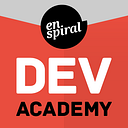Preparing for Foundations
Some key pieces of advice for beginning your journey into Dev Academy’s Web Development programme.
Enspiral Dev Academy’s rapid web development course is separated into two parts: a remote learning component, called Foundations, which students complete from home in their own time, and an in-class Bootcamp at the Auckland or Wellington campus.
Foundations takes 10 or 15 weeks part time, or 5 weeks full time, and Bootcamp is 9 weeks long. Some students spend 75 hours a week learning while on Bootcamp. You must finish all 5 Sprints of Foundations before you can begin Bootcamp. Foundations is the preparation phase — it ensures that people with all levels of experience can gain enough knowledge to jump into the material when they start Bootcamp. Foundations covers HTML, CSS, JavaScript and GitHub fundamentals, and by the end of it you can build a very basic web app on your GitHub webpage.
Having just finished Foundations, these are my tips for those thinking of jumping in. If you have more tips please leave them in the comments.
Preparing for Foundations:
- You can do it. Write it on your wall, on your desk, on your laptop and refer back to this if you don’t believe it.
- Play around with some introductory coding tutorials, i.e. check out Codecademy.
- Read the ‘How to Turn Cyborg’ blog series to get a sense of this student’s learning journey through Foundations (back when it was called Phase Zero).
- Look on TradeMe and Seek for the tech jobs available, or look overseas in places like AngelList. Examine the skills they’re looking for, where they’re based and how much they’re offering. There are many, many more tech jobs that are unlisted, but this will give you some sense of what you’re working towards, which is good motivation.
- Attend tech events! I know I will only enjoy something new if I learn to love it, so I like to see other people who LOVE code in action, how happy they are and the kinds of things they talk about. It makes me think ‘They’re just like me’ and ‘I want to be part of that.’ This is motivation. You get to meet people who are doing cool things for startups or who work while travelling, and this is also good motivation. And it builds your network for when you’re jobseeking after the course. Railsgirls is excellent, and free.
- With all this motivation, imagine your goal, your dream job, your dream lifestyle that tech skills could enable. Visualise it, draw a shoddy picture of it, write some key words, and stick it to the wall above your computer. It may not be immediately achievable, it may not be achievable for several years, but this is your motivation. It will help you when the going gets tough.
- When you decide to do Dev Academy, give yourself time to complete Foundations proportionate to how much you have going on in your life and how confident you feel with code. Try to have enough time so that you can have fun with it, rather than it being a burden or a stress.
- Take detailed notes, and revise them! The traditional components of study still apply: You are going to forget things so write the important stuff down, and read through it at the end of the day and the end of the week so you’re less likely to forget it next time. When you read through it, highlight the things that aren’t clear and Google them later.
- Don’t give up. When you start flailing, read through your notes, talk to your cohort and message your teacher. You have all the tools, and they are there to help.
- While you’re doing a Sprint, take time out to read about the concepts, and if an explanation doesn’t make sense, Google for a different one. Everyone understands things differently and that’s okay, just keep hunting until you find an explanation that works for you.
- When you finish a Sprint, think ‘What’s one fun thing I could do with what I’ve learned’ and do it. This will solidify your learning.
- Talk to your friends and whānau about what you’re doing. Explaining complicated things in basic terms to people who don’t know anything about it forces you to clarify what you’ve learned, and highlights what you’re confused about. It’s the best practice, and it helps them stay involved in your journey too.
- Come into the Dev Academy campus and ask questions. You are completely welcome to code from a spare desk in the space, get to know the teachers and the startups on campus and ask for some expert support. They also have a great kitchen and twice-weekly yoga.
- Celebrate your achievements! When you make your first webpage, design your first stylesheet, build your first JavaScript game, celebrate! Show your friends and whānau and give yourself a little reward. It’s fun to make things work — it’s like digital magic, and you’ll feel so proud of yourself when you solve a problem and make cool things happen online. You’ll also be amazed at how quickly you learn to do these things. Take time out to pat yourself on the back — and enjoy the journey! Welcome to the wonderful world of web.
If you’d like to upgrade your career and jump into learning the tools of tech, apply for Dev Academy today.

